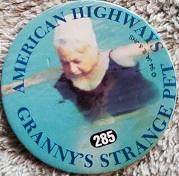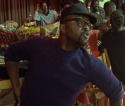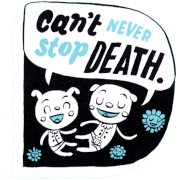|
I was thinking today, some of the movies that have been around that have done the one long unbroken take (fake or otherwise) sometimes feel a little exhausting to watch, like it's a melody that's unresolved. You spend a bunch of time watching the movie thinking 'god when is it going to cut' but Birdman doesn't feel like that at all. The long takes feel effortless and unobtrusive, like the camera is another character silently following whoever they find interesting around. Problems with the script aside, which is pretty rough, it really is excellently directed.
|
|
|
|

|
| # ? Apr 23, 2024 10:15 |
|
Blisster posted:
I'm a Carver fan and the overly dramatic readings kind of took me out of it. His work has always seemed much quieter to me. I know they had to make it theatrical and liven things up, but wonder why they went so over the top cartoony. If it was just to take another jab at the audience/critics and high/low art, I thought it was redundant. And why reduce the "success" of the play to a gimmick? You could still make the point about snooty audiences and have them won over by a brilliant production. The movie seemed to be saying that theater audiences and critics are right in thinking that Hollywood actors can't make a great play. Did he kill himself at the end because he realized that he had not succeeded in creating great art, and was just a hack actor after all? What we talk about when we talk about love: http://www.newyorker.com/magazine/2007/12/24/beginners
|
|
|
|
The point is that all that stuff is peripheral to whether it's good art. The Birdman stuff is silly, but that's not why it's bad art- it's bad art because it's soulless. The play is also silly, but Riggan is pouring every aspect of himself into it to the point of serious injury; there's the key difference.
|
|
|
|
LORD OF BUTT posted:The point is that all that stuff is peripheral to whether it's good art. The Birdman stuff is silly, but that's not why it's bad art- it's bad art because it's soulless. The play is also silly, but Riggan is pouring every aspect of himself into it to the point of serious injury; there's the key difference. Right, but pouring one's soul into something doesn't necessarily make it good art either. Riggan poured his soul into it and created what seemed to be a nondescript play that would have died on the vine if not for him shooting himself in the face. Is he to be considered successful just because he did something from his soul instead of for a big Hollywood paycheck?
|
|
|
|
I think it makes sense for the play to not be that great, and full of very 'actorly' things for the star to do to prove that he's a respectable thespian now. Like maybe it's good but it's amateurish in places and he's faithfully repeating words that work better as prose. It's tricky to do any kind of art within a film and present it as acclaimed or wonderful, because opinions are subjective and the viewer might think "why do people like this?"
|
|
|
|
Maxwell Lord posted:I think it makes sense for the play to not be that great, and full of very 'actorly' things for the star to do to prove that he's a respectable thespian now. Like maybe it's good but it's amateurish in places and he's faithfully repeating words that work better as prose. Agree that it's tricky and that opinions are subjective, but it seems like they made it clear that this was not a first-rate production. The words may have been faithful to the prose but the readings were really hammed up, which I think most people caught, which seems to reinforce the notion that the critics were right, he's just a Hollywood actor that shouldn't be taken seriously- someone who only got accolades for a dumb gimmick.
|
|
|
|
But maybe him gaining notoriety and not legitimacy by walking in his underwear through Times Square and shooting off his nose was the point. Maybe he just didn't have the chops and it all fits together as a portrait of delusion. I guess the question is, what exactly was Riggan thinking before he went out the window?
|
|
|
|
socketwrencher posted:Right, but pouring one's soul into something doesn't necessarily make it good art either. Riggan poured his soul into it and created what seemed to be a nondescript play that would have died on the vine if not for him shooting himself in the face. Is he to be considered successful just because he did something from his soul instead of for a big Hollywood paycheck? That's basically what I took from the movie, yeah. It's not supposed to be realistic, the movie's a giant parable.
|
|
|
|
socketwrencher posted:I'm a Carver fan and the overly dramatic readings kind of took me out of it. His work has always seemed much quieter to me. I know they had to make it theatrical and liven things up, but wonder why they went so over the top cartoony. If it was just to take another jab at the audience/critics and high/low art, I thought it was redundant. And why reduce the "success" of the play to a gimmick? You could still make the point about snooty audiences and have them won over by a brilliant production. The movie seemed to be saying that theater audiences and critics are right in thinking that Hollywood actors can't make a great play. Did he kill himself at the end because he realized that he had not succeeded in creating great art, and was just a hack actor after all? It seems like Riggan not really 'getting' Carver was a bit of characterization on his part. He didn't care for Carver because it resonated, it spoke to him; Riggan liked him because Carver gave Riggan 'legitimacy'. It goes back everything being about how Riggan sees the world; he chose to adapt "What We Talk About When We Talk About Love" because it was an ill-conceived attempt at going back to his roots and gain legitimacy. It was never because he liked Carver's work, or that it resonated with him.
|
|
|
|
LORD OF BUTT posted:That's basically what I took from the movie, yeah. It's not supposed to be realistic, the movie's a giant parable. It makes sense in that sense. Kind of reminds me of that old joke though: Mother: As long as you try your best, I don't care if you get Fs in school. Child: Really? Wouldn't that make it so much worse?
|
|
|
|
umalt posted:It seems like Riggan not really 'getting' Carver was a bit of characterization on his part. He didn't care for Carver because it resonated, it spoke to him; Riggan liked him because Carver gave Riggan 'legitimacy'. It goes back everything being about how Riggan sees the world; he chose to adapt "What We Talk About When We Talk About Love" because it was an ill-conceived attempt at going back to his roots and gain legitimacy. It was never because he liked Carver's work, or that it resonated with him. Interesting. I guess I read it differently. I thought Carver's work meant something to him on a deep level. Lots of lost and broken men in Carver's stories.
|
|
|
|
with a movie like this it is pretty silly to say it is one way or the other.
|
|
|
|
socketwrencher posted:Interesting. I guess I read it differently. I thought Carver's work meant something to him on a deep level. Lots of lost and broken men in Carver's stories. Carver's endorsement of his career means nothing if nobody will take it seriously, so he just gives up on it; alternately, it could be read that nobody cares about how much Riggan likes and respects some writer, everyone will shut down that side of him and will only respect him for Birdman. There's no shortage of people throughout the film who respect or admire Riggan, after all, it's just always for one thing, and none of them have probably ever heard of Raymond Carver.
|
|
|
|
Cole posted:with a movie like this it is pretty silly to say it is one way or the other. Not sure what you mean. Is it all just a matter of personal interpretation?
|
|
|
|
Nakar posted:I think his inability to get Carver (regardless of whether he does like and read Carver) is part of the long-running dark comedy of the film. It certainly changes the nature of the story. It's one thing if he doesn't get Carver, and another if he gets him but can't make it work. The latter adds an additional layer of pathos and makes his desperation more compelling in my view. Nakar posted:The character he's playing in particular is an odd choice, and then there's the way he changed the script which isn't something you'd think someone who deeply respects a writer would do with their work. Agreed. while I think it's reasonable to allow for creative license in order to make the material more theatrical, I'm still trying to figure out what they were going for here. Nakar posted:As he mentions, Carver signing that napkin of his "inspired" him, not Carver's work itself. I think it again goes back to the idea of legitimacy and adoration, where he thought it was important not because of an inherent merit, but because of who it was that praised him. Notice that he shows Mike the napkin and Mike is unimpressed ("He was drunk") and then he tries to show it to the critic and she's having nothing of it. He then abandons the napkin in the bar and it's never seen again. I think it could be both the idea of legitimacy and the inherent merit of real art that's driving him. I took him abandoning the napkin as exasperation that nobody grasps the significance except him, not as him casually tossing it away as if it no longer had meaning. When Mike steals his napkin anecdote, it matters, it's not nothing, and I don't think that comes from just a desire to be seen as legitimate. Nakar posted:Carver's endorsement of his career means nothing if nobody will take it seriously, so he just gives up on it; alternately, it could be read that nobody cares about how much Riggan likes and respects some writer, everyone will shut down that side of him and will only respect him for Birdman. There's no shortage of people throughout the film who respect or admire Riggan, after all, it's just always for one thing, and none of them have probably ever heard of Raymond Carver. Right, he views that respect and admiration as superficial, and for all the Birdman hoopla, where did it get him? Broke, personal life in shambles, zero credibility as a true artist- not just in the eyes of critics and fans, but in his own eyes. He gave up everything for what he got, and this was his last chance to save his own life. Which, in my interpretation, he was unable to do.
|
|
|
|
socketwrencher posted:Not sure what you mean. Is it all just a matter of personal interpretation? That's what I take from it. This is a movie that spends a lot of its time on the fence and doesn't commit to any specific interpretations. Does he really feel like Carver's work speaks to him or is it just a reaction to receiving the childhood compliment? Does he really have powers or is he just crazy?* And so on. *Although I would argue this one comes down on a side way more than most people seem to say it does
|
|
|
|
Bown posted:That's what I take from it. This is a movie that spends a lot of its time on the fence and doesn't commit to any specific interpretations. Does he really feel like Carver's work speaks to him or is it just a reaction to receiving the childhood compliment? Does he really have powers or is he just crazy?* And so on. Agreed on the lack of specific interpretation. *I took it not so much as crazy as haunted by the past and regret.
|
|
|
|
http://en.wikipedia.org/wiki/Cutting_off_the_nose_to_spite_the_face The expression refers to a needlessly self-destructive, over-reaction to a problem. Now, as this action literally takes place in the film, and ours a language of symbolism, we have to ask what the scene means. Riggan is Comic Book Movies. You could also say he's Comic Book Movies, yearning to be Art. So he's both things. So Comic Book Movies are cutting the nose off of Art to spite it's face; it will solve the problem, people will pay to see your art because it's good because blood (soul, feeling, realism, whatnot), but not REALLY solve it because as we can all see, the play is still poo poo, he's still a hack. We're ruining Art by pretending that Comic Book Movies could ever BE Art. Hollywood (the theater) sells out the play, but there's nothing really worth seeing. I also loved the symbolism of Keaton, Norton, Stone, as the Genesis of Comic Book Movies, the Time When We Realized They Could Be Terrible, and the New Generation of Them. (Batman, Hulk, Amazing Spiderman). Of course Norton is Keaton's idol in the film, he's the one who got to do one lovely Comic Book Movie and then grow from that to real film, while Keaton was stuck in Multiplicity (and whatever in-film movie his wife makes fun of him for, "the one with Goldie Hawn"). Stone's self-destructive behavior (drug use), and diatribe of "You don't matter, my stuff matters now, because it's what people like, not stuffy pretension", fits perfectly with the idea that Burton's Batman could've given birth to something as soulless and banal as the new Spider-man movies. She is living for the moment, tweeting facile nothings, destroying herself -- the state of Comic Book Film today. I'm ranting because I just saw it, and also because my Dad called me today to ask "why the hell did this thing win so many awards, it was just some rear end in a top hat going crazy and then a bullshit artsy ending", and I can't yell at him, he's my dad.
|
|
|
|
I saw the ending as the whole shebang with shooting his nose off and accepting his Twitter page, jumping out the window, is him mistaking notoriety for the real artistic fame and authenticity he craves. Hey, he's happy in his ignorance, quite an unexpected virtue after his breakdown! And, as he revels in his fake (non authentic) "fame" which is really notoriety, he believes his own bullshit like believing he can fly without being Birdman, which is as bullshit as all the other little self delusions he performs like levitating etc. His millenial daughter believes in him too, finally - as he's made it in a world she understands, and earlier proved with her rant she believes in. Twitter, etc. It's not a comet - it's a falling star. In reality his star has fallen; he (and not even alone) has ignorantly confused notoriety for what he craved and could never have. But - if a thing is just a thing, labels don't matter, so he can have his ignorant happy ending after all. Hence ze title.
|
|
|
|
Reading this topic, I feel the movie, for a fair bit, flew over my head. To me, it was a story foremost about a terrible father who can never be content. Success, family, his daughter, wealth, superpower, it's never enough. It's a sickening look in the psych of a horrible person who only exists to achieve praise from whichever group he hasn't reached yet. He doesn't know the names of his crew, his fellow actors are just means to his own success instead of people to stimulate, he blatantly ignores his "pregnant" girlfriend, takes a second mortage. It's a bitter and bleak look at a narcissistic, egocentrical character. His daughter literally comments on it, when he finds out she's smoking pot. I found it quite darkly as well, because he doesn't grow one bit. In fact, he nearly kills himself for his goal and only when he succeeds (if you want to call it that), he finds the time to connect to his ex wife, for just a moment. Meanwhile, it says a lot about art, acting, fame and what not, but I really walked out feeling I watched a bleak family drama. I'll definitely rewatch it having read this topic. It's a treat to watch Keaton and Norton perform in this one regardless.
|
|
|
|
I just watched this and I'm going to be a bit cynical, the high vs. low art theme (and we're producing and appreciating high art The no-seams bit was well done but I started looking for the seams about 10 minutes in, like obvious cuts to bits scenery during a camera pan.
|
|
|
|
Acht posted:Reading this topic, I feel the movie, for a fair bit, flew over my head. I don't think any of that is wrong or misinterpreted at all.
|
|
|
|
Advice posted:The critic scene was possibly the worst in my opinion but for a reason I don't see people bringing up. You get in a car wreck, you remain calm and composed. When you get home you cry and freak out. Surlaw posted:The critic being unflinching said to me that this isn't the first time she's been through this routine. The fact that she writes a positive review anyway shows that her persona is as much of a facade as anyone else in the film. A huge part of the movie is appearances and the way we present ourselves to the public, dropping her stoic character would be bad for her reputation. Bird in a Blender posted:The critic's speech to Riggan can probably be seen as her challenging him. She puts him down before even seeing the play to see if he goes and improves his performance. pwn fucked around with this message at 00:48 on Apr 14, 2015 |
|
|
|
This movie is so far up it's own rear end it exits through the mouth.
|
|
|
|
Advice posted:She acts in a manner literally no person would when confronted like that. Entire scene took me out of the movie more than the goddamn CGI robot bird did.
|
|
|
|

|
| # ? Apr 23, 2024 10:15 |
|
This finally went on HBOGO so here I am. I didn't like it. Most of it's difficult to watch, because it's one farcical anxiety dream after another. After a while the long takes seemed to detract as something technically impressive but not narratively helpful. Every character is an ancient and banal Hollywood cliche, right down to every woman being some combination of undersexed, naive, or hysterical. Farcical characters having phony dilemmas, a self-indulgent movie about self-indulgence, which would be the joke if it were funny. At the end of the day I don't care. This isn't a movie about anything real or interesting. It's not about people, it's actors riffing on their reputations gained by way of Variety while the director doesn't know when to quit. A technically-demanding shoot isn't by the fact itself meaningful.
|
|
|


























